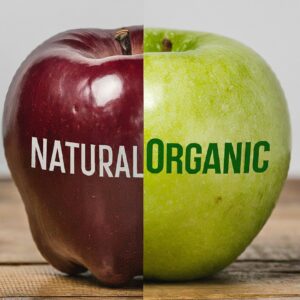Organic products are not simply natural, but all organic products can be considered natural. Here’s a breakdown of the key differences:
Natural:
- Definition: Used loosely in marketing and lacks clear regulations.
- Meaning: Generally implies minimal processing and the absence of artificial ingredients, but doesn’t guarantee anything about farming practices.
- Example: A fruit might be labeled “natural” but could have been grown using conventional methods, possibly including synthetic fertilizers and pesticides.
Organic:
- Definition: Strictly regulated and certified by recognized organizations {like NPOP (organic India) in the India & USDA Organic in the US} adhering to specific standards.
- Meaning:
- No synthetic pesticides or fertilizers: Uses natural methods for pest and weed control.
- No genetically modified organisms (GMOs): Prohibits GMO seeds and any products with GMOs.
- Sustainable practices: Focuses on maintaining soil health and promoting biodiversity.
- Example: An apple labeled “organic” is certified to have been grown according to these standards.
Are organic products “better”?
There’s no simple answer as it depends on your priorities:
- Health:
- Nutrition: No conclusive evidence shows organic food is inherently healthier.
- Pesticide Residue: Studies suggest potentially lower levels in organic products.
- Environment: Generally considered more environmentally friendly due to sustainable practices.
- Ethics: Appeals to consumers who value animal welfare, environmental sustainability, and avoiding GMOs.
Example :-

The image uses contrasting visuals to illustrate the key difference between natural and organic:
- Natural: The apple appears unblemished and shiny, potentially reflecting the use of artificial waxes or other treatments commonly associated with conventional farming.
- Organic: The apple appears more natural with a slight blemish, suggesting it wasn’t treated with artificial chemicals or undergone excessive processing.
Ultimately, the choice is yours:
- Consider your budget: Organic products can be costlier.
- Evaluate your health goals: Weigh nutritional value alongside potential benefits like lower pesticide residue.
- Think about your environmental concerns: Choose organic if sustainability is a priority.
- Reflect on your ethical values: Consider if organic aligns with your values regarding animal welfare and GMOs.
Remember, choosing organic is just one factor to consider when making informed choices about the food you buy.
